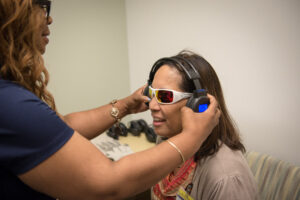Everyone has been there at some point in their lives: you forget where you parked your car at the mall or you can’t find your wallet in all of the usual places. Instances like these are bound to happen at various points throughout your life and typically speaking, they aren’t a cause for concern. However, if you’re noticing yourself or a senior loved one struggling with routine memory loss, it could be a red flag for the onset of dementia or Alzheimer’s disease.
Below, our senior memory care in Lincoln has compiled a list of the key dementia warning signs that you need to be aware of:
#1.) Routinely Forgetting Important Information
One of the earliest signs of dementia include routinely forgetting important information, especially if you are struggling with your short term memory. This might look like failing to remember special dates or the recent plans you made to meet up with friends. You might also find yourself asking the same questions over and over, either forgetting the answer that was given to you or not even remembering asking in the first place. In addition to this, you could likely be relying more heavily or almost exclusively on memory aids, such as sticky notes or phone calendar reminders.
#2.) Difficulties with Problem Solving
Being able to effectively and quickly solve a problem is an essential part of everyday life. For example, you need problem solving skills when cooking, baking, handling household finances, driving a car, and so much more. Should you or a senior loved one be struggling in this area, it could be time to schedule a visit with your doctor. Leaving these behaviors unchecked can be very dangerous, including leaving yourself susceptible to financial fraud or putting your safety at risk every time you get behind the wheel of your car.
#3.) Confusion Regarding Time and Place
Have you ever noticed yourself or your senior loved one having difficulties remembering where they are or what the date is? Those with dementia or Alzheimer’s disease often struggle recalling today’s date or may repeatedly ask for the current time. Also, they may not remember what month or even what season it is. Should this start happening more and more frequently, it could be time to start looking for options for senior memory care in Lincoln.
#4.) Struggling to Clearly Communicate
Another major red flag for dementia is if you or your senior loved one is having a hard time communicating. This could include both verbal and written communication. However, this doesn’t always look like having difficulties speaking, or as it’s medically known, dysarthria. Forgetting common words or subbing them for gibberish or nonsensical phrases can also occur. As an example, you might not remember the word ‘spoon’ and call it a ‘food scoop’ or refer to a household object as a ‘thingamajig’.

#5.) Inability to Retrace Steps
As mentioned previously, everyone can be forgetful from time to time. Typically, most people can retrace their steps to hunt down their lost keys or to find where they parked their car. Someone with dementia, however, likely won’t be able to. You might find their misplaced objects in strange or bizarre locations, such as the remote winding up in the freezer or their shoes hidden away in the pantry. As the disease progresses, it is not uncommon that the person affected will begin to accuse others, including close relatives and friends, of stealing.
#6.) Poor Impulse Control
Perhaps one of the most dangerous aspects of dementia is the fact that those inflicted will experience poor impulse control and an overall lack of good judgment. This often manifests itself as the inability to manage finances, leading to risky investments or giving away information to scammers. Another obvious red flag is if you begin to notice a lack in personal hygiene or the inability to properly care for one’s self by following routine tasks, such as showering or combing their hair.
If left without assistance, this behavior can dramatically decrease a senior’s quality of life. It can also be extremely costly, especially if the senior ends up sharing critical financial information. One way that you can gain peace of mind is by moving to a memory care community, such as CountryHouse. Our staff at the senior memory care in Lincoln are compassionate and highly trained professionals who are there to help keep residents safe.
#7.) Disinterest in Work or Socializing
Everyone has a hobby or activity that they truly love. Whether it be gardening, crafting, cooking, painting, or more, this activity is capable of sparking your interest regardless of how you’re feeling. A person living with dementia, however, likely will increasingly lose all interest in their hobby. Not only that, but they will commonly appear to be withdrawn from social gatherings, even if they are spending time with people that they truly care about. If you have noticed this happening to yourself or a senior loved one, it’s something worth mentioning to your primary care physician.
#8.) Drastic Change in Personality
Big shifts in your personality and mood are very much a cause for concern. While there may be another underlying cause, such as struggling with depression or anxiety, it could also be an indicator of dementia. Have you noticed yourself or your senior loved one becoming anxious, confused, or fearful, even in daily situations? Are your habits becoming more detailed and particular when you were once very carefree? These drastic changes shouldn’t be ignored or overlooked.
The Best Senior Memory Care in Lincoln
Here at CountryHouse, memory care is our primary focus. This means everything regarding our community, from the floorplan of our building right down to the daily activity calendar, is catered specifically to those with dementia or Alzheimer’s disease. We strive to curate an environment that prioritizes the safety and wellness of our residents.
To learn more about CountryHouse or to schedule a tour, be sure to contact us today! We have many great locations across several states, including our beautiful community right here in Lincoln, NE.



